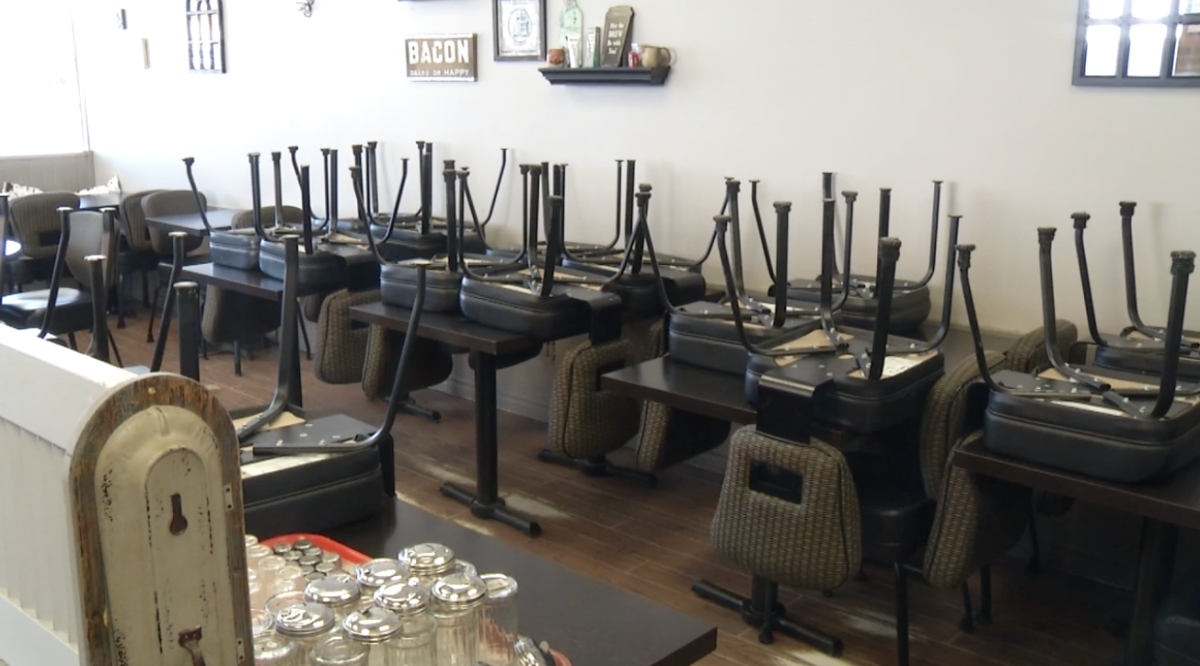While many of the supports and assistance restaurant owners would like to see as the novel coronavirus pandemic continues are beyond the means of the municipality, there is something locals can do, says London, Ont.’s deputy mayor.

Coun. Jesse Helmer suggests all Londoners have a role to play in keeping area businesses afloat, and that bypassing delivery apps when ordering food would help.
Sit down service has been barred as one of the measures the province has taken to stem the spread of the novel coronavirus, but many restaurants are continuing — or just now implementing — takeout and delivery options. Helmer suggests that Londoners order directly from local restaurants when they decide to order food, rather than using delivery apps.
The comments on Friday come a day after the city held a conference call with numerous members of the local restaurant community.
“A number of ideas were raised and I think it was very clear we’ve got a really ingenious group of people running restaurants and adapting,” Helmer told Devon Peacock on The Morning Show.
“They’ve switched to doing a lot of delivery but they did raise issues around the costs that the delivery companies are imposing on the restaurants and that’s certainly something we’re seeing not just in London but around the province and nationwide, even internationally.”
Joelle Lees, owner of Michael’s on the Thames on York Street at the river, has her own staff providing delivery services to avoid the steep commissions charged by delivery apps.
“People are using Uber Eats or Skip the Dishes but the commissions that they want are 25 to 30 per cent,” she said.
“The profit right now — I mean, it was always low for our restaurant — is even less if you’re having to use delivery services such as those. What I did was I asked some of my front of house servers to come back to work and they are my drivers.”
Helmer said he’s very concerned about the future of local restaurants and is urging Londoners who are able to do so, to order directly from the business.
“If we do that as a community, if we all step up and say ‘on Mondays and Fridays I’m going to order from local restaurants and I’m going to try to do it in a way that is most supportive to their actual operations,’ I think that will help more of them survive.”
Outside of delivery app fees, taxes were cited as another concern.
“We are still paying full taxes,” Lees told Devon Peacock on The Morning Show on Friday.
“There was an increase in city taxes just after the pandemic. Our revenue is down 83 per cent but we’re still responsible for our full tax, our full rent. The wage subsidy is great but if you didn’t get your employees back to work right away, you’re not eligible.”
While the city has approved property tax deferrals for residents and local businesses, Helmer noted that restaurant owners are looking for more relief.
“We are on the province about making the business education tax rate uniform — that would provide a huge amount of relief for London commercial property taxpayers on the order of about seven per cent if the province were to make that just the same rate across the province.”
Currently, the provincial business education tax (BET) rate is 1.25 per cent for London, whereas in Toronto, for example, it is 0.98 per cent, Helmer explained. BET rates have been an issue long before the pandemic, with changes from the province repeatedly deferred over the course of more than a decade.
According to a report to the Corporate Services Committee on April 14, 2020, the province had announced back in March 2007 that it would be “phasing in uniform rates for commercial and industrial property classes over an eight-year period ending in 2014” but in March 2012 it was announced that “business education property tax cuts” scheduled for 2013 and 2014 would be deferred until at least 2017-18.
Come 2018, no announcement had been made and a letter from then-Mayor Matt Brown to then-finance minister Vic Fedeli prompted a response that “appeared to acknowledge that the current system for setting business education property tax rates is inequitable” but that yielded no time frame for change. Most recently, Mayor Ed Holder sent a letter to finance minister Rod Phillips on July 16, 2019, and the report noted that as of mid-March, no response had been received.
City staff says that if the province “had fully implemented the tax cuts originally promised in 2012,” then in 2019, “it would have reduced most commercial and industrial property taxes in the City of London in excess of 7 per cent” or roughly $10-million annually.
In the meantime, Lees appeared to be pleased by the city’s communication efforts.
“There were at least 20 of us on the call and quite honestly everybody on the call is suffering the same things. I think one of the biggest things that came out of it was the communication with what’s going on,” she said.
“They listened to everybody, they took notes. Again, the biggest thing is the communication. We all commented that this was a great form, it was great to hear from other people — not necessarily about the struggles, but what everyone is dealing with.”
Still, she says she’s worried about how long the pandemic will last.
“We rely on being full on the weekends, we like 160 seats full. That’s where we make our revenue because the Monday to Thursday is your sort of ‘break-even.’ Your Friday, Saturday, Sunday — that’s your incremental revenue and you rely on that,” she said.
“You go to bed with that knot in your stomach and you wake up and it’s still there.”
Scot Crawford, owner of The Bungalow in Old North, was less eager to describe the call as a success.
“I hope that our call with the city went well. I hope things were understood. But it did leave me with some concerns.”
Crawford is advocating a regional reopening — an approach Mayor Ed Holder is strongly against — and believes it’s urgent that small businesses open again. Crawford is also concerned about limitations expected to be placed on restaurants once they are able to reopen, particularly capacity.
“For restaurants, margins are paper-thin. The average full-service restaurant in Canada earns less than 3 per cent and that number is based on 100 per cent capacities.”













Comments